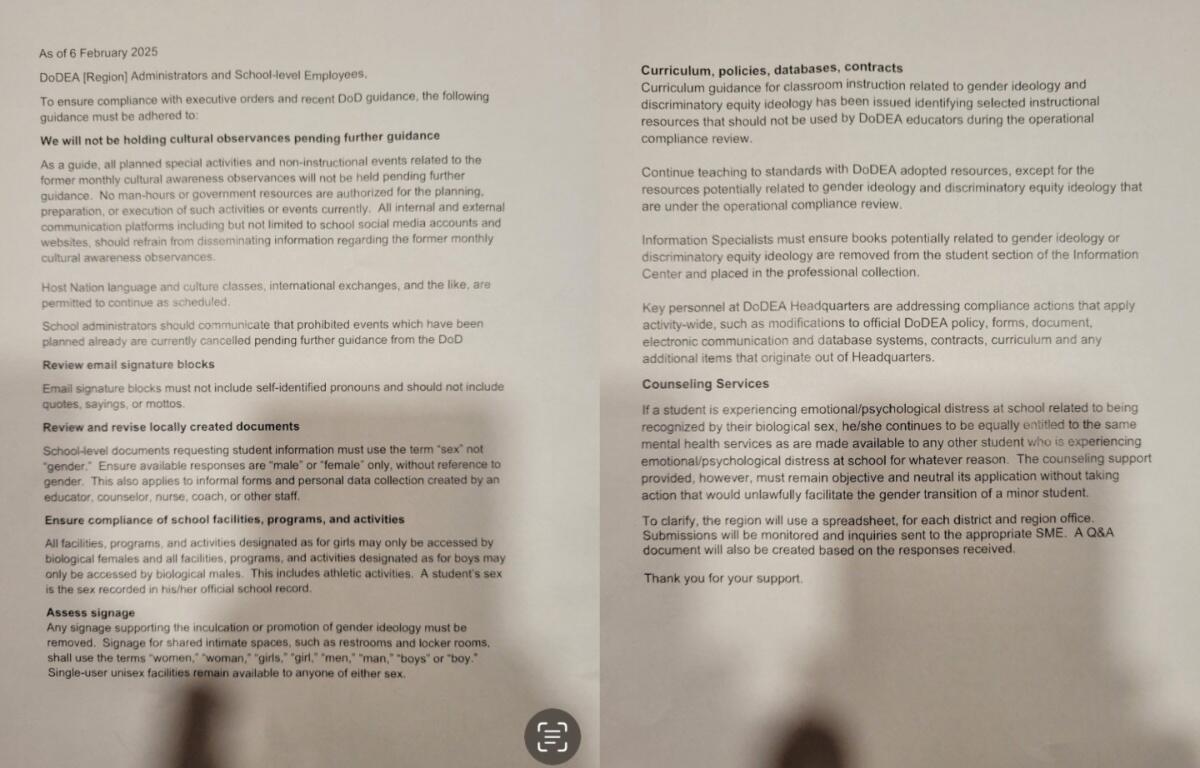FORT CAMPBELL, KY (CHRISTIAN COUNTY NOW) – A federal judge has ruled in favor of students from Fort Campbell’s Barsanti Elementary School and a few other Department of Defense schools worldwide, finding that the government’s “partisan interest” violated students’ First Amendment rights when it removed library books and altered classroom lessons.
In a 44-page opinion issued Oct. 20, U.S. District Judge Patricia Tolliver Giles ordered the Department of Defense Education Activity (DoDEA) to halt its “book quarantines” and restore access to previously removed materials.
The ruling stems from a lawsuit filed by 12 students – four from Fort Campbell – who said DoDEA’s nationwide removal of books on race, gender and history, as well as the cancellation of Black History Month celebrations and similar events, amounted to “government censorship.”
EO impacts school restrooms, holidays and books
On Feb. 6, DoDEA (the Department of Defense Education Activity) sent to administrators and school employees at 161 schools around the world a letter “to ensure compliance with executive orders (EO) and recent DoD guidance.”

According to a copy of the letter obtained by Clarksville Now, celebration or promotion of “monthly cultural observances” were banned. At Fort Campbell, teachers removed all bulletin boards that reference Black History Month and Black leaders like Martin Luther King Jr., according to previous reports.
One of the directives called for the removal of all books and materials related to “discriminatory equity ideology.” Librarians were instructed to ensure any such books were to be “removed from the student section of the information center and placed in the professional collection.”
At Fort Campbell, administrators and librarians interpreted that to mean anything that deals with diversity, inclusion or equity, and anything that could be perceived to promote one group over another or make one group look bad, which would have included any books that mention slavery, the civil rights movement or the treatment of Native Americans.
First Amendment violated by ‘partisan interest’
On April 15, a lawsuit was filed by the American Civil Liberties Union (ACLU) on behalf of 12 students from six families that attend DoDEA schools as children of active-duty servicemembers, including Fort Campbell.
The DoDEA argued that choosing which books to include or remove was “government speech” – meaning the government has the right to control its own message, but the court rejected this argument, saying that school libraries are places of “intellectual freedom” meant to provide information on a broad range of subjects and viewpoints, not to express the government’s views.
In her ruling, Judge Giles found that the DoDEA, was “impermissibly motivated by a partisan interest” when it removed hundreds of library books from schools, including Barsanti Elementary. The court determined that the book removals were not based on educational value but were instead driven by political directives tied to President Donald Trump’s executive orders targeting “gender ideology” and “divisive concepts.”
The First Amendment, Giles wrote, prohibits schools from removing books simply because officials disagree with the ideas inside them, and public schools cannot suppress books to enforce a political or ideological viewpoint. The book removals under DoDEA’s policies did just that as they sought to block access to books the administration considered “radical” or “divisive.”
The court also rejected the government’s claim that the removals were based on “pedagogical” or educational reasons.
“In all candor, the Court cannot contemplate the pedagogical basis for banning the ‘Gender and Sex’ module from Advanced Placement Psychology; lessons on immigration in elementary school; chapters on ‘Human Reproductive System, Menstrual Cycle, and Fetal Development,’ ‘Abuse and Neglect,’ and ‘Adolescence and Puberty’ from health education textbooks; and celebrations related to ‘identity months,’ including Black History and Women’s History Months,” Giles wrote.
Preliminary injunction granted, but partially
The plaintiffs argued that any injunction should apply to all DoDEA schools, but the defense countered that “relief should be limited to the five DoDEA schools at issue in this case.”
The five schools are:
- Crossroads Elementary, Quantico, Virginia
- Barsanti Elementary, Fort Campbell, Kentucky
- Aviano Middle-High, Aviano, Italy
- Stollars Elementary, Misawa Air Base, Japan
- Egdren Middle-High, Misawa Air Base, Japan
The plaintiffs compared the DoDEA to a single school district, but the court could not agree with that statement given that the DoDEA is comprised of 161 schools across nine districts in 11 foreign countries, seven states, Guam and Puerto Rico.
Additionally, Giles wrote that the Supreme Court recently said, “A universal injunction can be justified only as an exercise of equitable authority, yet Congress has granted federal courts no such power.”
Giles ordered the DoDEA, Dr. Beth Schiavano-Narvaez, and Secretary of Defense Peter Brian Hegseth to stop removing or reviewing books based on political criteria at the plaintiffs’ five schools.
Additionally, she ruled that the defendants were to immediately restore the books and curricular materials that have been removed since Jan. 19 due to the Executive Orders to their preexisting shelves, classrooms and units at those schools as well.
While the decision is a preliminary injunction – meaning the case will continue – the ruling immediately blocks DoDEA from enforcing its current book and curriculum restrictions at those five schools. For Fort Campbell families, that means previously removed books and classroom materials will be made available again while the lawsuit moves forward in federal court.


